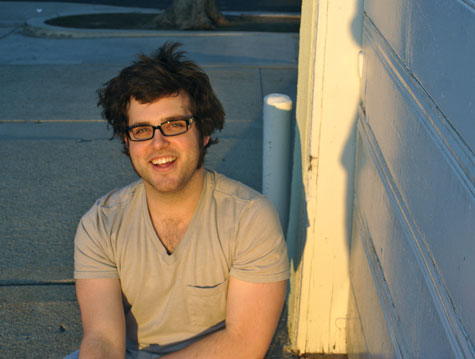
PERMANENT PRESS The beats of Baths’ Will Wiesenfeld sound like they’re generated by the kindest, most careful dishwasher in the world. |
Will Wiesenfeld believes in making purposeful choices. Take, for example, the time he was figuring out the title of Baths' 2010 debut, Cerulean (Anticon). The multi-instrumentalist behind the one-man project (which comes to the Middle East downstairs next Thursday) didn't just want to name the record after any random shade of blue — he wanted cerulean."It is actually a more open-ended color," Wiesenfeld says by phone from his home outside Los Angeles. "When you say 'navy blue,' that's an exact color, but when you say 'cerulean,' it's sort of like a spectrum of blue hues — the intensity of the blue but not really an exact color. I was really attracted to that because there were all these different examples of what cerulean looked like online. That just made for a good all-encompassing feeling for the album: positive and watery and all these other things."
He also tells me about the word's origins (Latin for "heaven" or "sky"), so it's clearly something he's thought about. A lot. And it is almost impossible to listen to Cerulean and not think about the color in some context. As Baths, Wiesenfeld develops glitchy electronica with glimmers of indie pop and experimental music glowing beneath the surface. His beats sound like they're generated by the kindest, most careful dishwasher in the world, while his voice is compelling for several reasons: it's tender, reclusive, and occasionally high-pitched and a bit ridiculous. Cerulean is a complicated record, sounding simultaneously synthesized (because of its machinelike rhythms) and organic (because of its elegant, handmade weave of sounds). You can visualize its songs draped in a soft, translucent blue whose tints can easily shift toward darkness or light.
Born in 1989, Wiesenfeld took on the piano at age four, but at 12 he experienced "a big falling out with classical music" after feeling that playing was "all repetition." He experienced a renaissance just a year later, developing a new fondness for contemporary music (e.g., Björk) and fiddling around with computer recordings. By 14, he was concocting what he once called "weird, shitty Euro-trance stuff." Before creating Baths, he had some 20 albums under his belt, including two other major projects, [Post-foetus] and Geotic.
Despite its complexity, Wiesenfeld doesn't think that Cerulean — the record that made Baths a breakout name — particularly espouses the "active listening" ideal. "Because Cerulean was the first instance of making an album that that I took pretty seriously or wanted out there, I sort of didn't take it too seriously, I just wanted to do whatever I felt," he says, in his typically self-contradictory way, describing the results as "lighthearted and off-the-cuff."
With Baths' second record, he hopes to write in a more involved, focused manner to compose "music that sounds very meticulous and intelligent and emotional." Wiesenfeld's statements on his work can be inscrutable, but you get the idea that even if his words get tangled, he's making exactly the music he means to be making.
Wiesenfeld has yet to begin recording Cerulean's follow-up, but he imagines that it will be darker. The next one probably won't be named after a color (if it were, it would be something "much more bleak, like blacks and grays"), but in quintessentially Wiesenfeld fashion, he wants the record's title still to be decisive and resonant. "I'm looking for hopefully a single word that's the most all-encompassing feel for the album."
BATHS + ANAMANAGUCHI + KI: THEORY | Middle East downstairs, 480 Mass Ave, Cambridge | December 1 @ 8 pm | 18+ | $13 | 617.864. 3278 or mideastclub.com